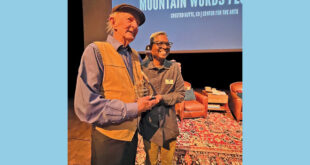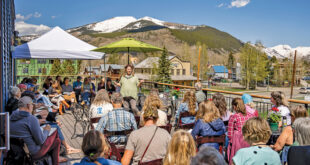Due to a fortuitous meeting in a bathroom at the Cinnamon Bay Campground on St. John in the U.S. Virgin Islands, Deborah Tutnauer now calls Crested Butte her home. It was there, in 1993, she met Sue (Heller) Tyzzer and spent the rest of the week hanging out on the beach with Sue and Andy. The chance meeting put Crested Butte on her radar.
Born and mostly raised in Port Washington, Long Island, New York, Deborah was the eldest of three girls and recalls, “It was a safe place, a quiet suburb, to grow up in. We did a lot of bike riding around the neighborhood and puppet shows in friends’ garages.”
But the most important childhood influence for Deborah was going to Girl Scout camp when, at nine years old, she fell in love with camping and living in a tent.

“It wasn’t the New York Jewish girl thing to do, but I was a bit of a misanthrope as a child. I just didn’t really fit in during those years of junior high school through … college,” she laughs. Her camp buddies lived all over Long Island and Deborah would get on her ten-speed road bike and ride as far as she could in a day, sometimes 20 miles round trip, to visit her Girl Scout friends. She’d live for the weekend camping trips where the girls would stuff their backpacks with Ritz crackers and eat Cheese Whiz right out of the can and hang out in the woods all day.
When Deborah was 16, her father was promoted to top executive of the Ritz Carlton Hotels and the family was transferred to Los Angeles—essentially, the other end of the cultural universe as far as Deborah was concerned.
“I hated it. It was too big, too noisy, too everything. I went to a supposedly good high school, but I hated it. I was a good student though.”
Having figured out how to ride the public buses, Deborah then mastered how to cut school without her parents’ knowledge and she’d bolt to the beach because, she felt, “That was the only redeeming feature about LA as far as I could tell. I had enough high school credits and was a good enough student, coming from a more advanced New York school, that I was able to graduate in January 1977 of my senior year and be done with it.” She had been accepted into Colgate College in Hamilton, N.Y. and headed back to the East Coast.
“At the time, I thought I wanted to be a doctor because I loved dissecting things, looking into microscopes and anything having to do with understanding how the human body worked. But I decided after taking freshman chemistry that I didn’t want to be a doctor,” Deborah said. So she took a different path into psychology and graduated in 1981.
“It was the height of the ‘Dress for Success’ early ‘80s era, and all my friends went on to be doctors, lawyers, stock brokers, investment bankers… and I went to Jackson Hole and became a ski bum and a waitress at the Mangy Moose Saloon,” she grins proudly, but confesses it was because she didn’t know what to do next. “I packed up my yellow 1974 VW convertible Bug and headed west. I had never been there. It was the winter of 1981/82.”
After her ski bumming, Deborah eventually moved to Portsmouth, New Hampshire, and became certified as an aerobics instructor a la Jane Fonda-style, and worked at a gym as a weight training instructor as well. As a volunteer to kids with emotional challenges, she was inspired to return to school for her master’s degree in special education, graduating from the University of New Hampshire in 1986.
“I began teaching special needs preschool kids aged three to six with moderate to severe special needs, both in New Hampshire and northern Massachusetts. I developed programs to work with children and their families, but at the same time I was struggling with the limitations of a public school system. The system seemed to think that many things were more important than my hands-on time with my students and helping them and their families. So, I decided to get another master’s degree in social work.”
Deborah got her MSW from the University of Denver in 1992 with a goal of specializing in helping families with children with special needs. “But first I had to go to Europe for a year.”
During her undergrad time at Colgate, Deborah had spent a semester living in a kibbutz in Israel, and a semester in Hong Kong. She was in one of the first tourist groups into mainland China when Nixon opened those doors. In 1992, the Iron Curtain had just come down and the Eastern Block countries were finally accessible for the first time in a really long time. “I had a friend in Budapest so I bought a one-way plane ticket and left with $700 in my pocket. I ended up filling a needed gap at the American School of Budapest.”
She found a place to live and connected with the expat community. “There were a lot of Americans pouring into Budapest at that time, and a lot of international companies coming in,” Deborah explains. The school had grown faster than they had anticipated and there were suddenly children with special needs and no one to teach them.
“I was connected to the parents of these students and they gave me a space, so I worked in the school but not for the school. I was basically an in-school private tutor for these kids with learning disabilities. I also taught English to Hungarian students.” The position, and private tutoring, allowed her to travel all over Eastern Europe on long weekends during the year she was there.
Upon her return to the U.S., Deborah wound up on the coast of Maine working at a mental health center as a psychotherapist. She spent winters driving eight hours round trip to ski at Sugarloaf, where she mostly hung out at the lodge warming her toes because, she mused, “It was butt cold.”
Two years later, during a frigid February in 1995, Deborah decided she was done with New England winters. She was now qualified to open a private psychology therapy practice, “I made a list of the type of place I wanted to live. I knew that I wanted to go back out west. The list had things like, don’t have to drive to go skiing, a small town with a warm, caring community, a town with a need for a child and family therapist, and affordable housing. Then I made a list of all the different ski resorts I was going to visit in Colorado, New Mexico, and maybe Utah. I quit my job, put my stuff in storage, found someone to watch my cats, packed up my car and headed west.”
The first stop on her list was Crested Butte because Sue Tyzzer had invited her. Deborah had only planned to stay for one week. She arrived in February ‘95 during a huge snow year and stayed for a month.
“I got a pass job and even though I left Crested Butte to finish out my plan, I had already fallen in love with the town and knew I was coming back. I visited all the other places but none of them were Crested Butte. It felt like home and it had everything on my list—except affordable housing.”
She opened her practice in her apartment in Crested Butte South that summer, with an office in Gunnison a couple of days a week, working with social services, probation, school district, and the mental health center.
Deborah laughs that she dated some Peter Pan Crested Butte boys before importing her now husband, Paul Greenberg. “I met him walking on the beach in N.Y. while we were both visiting family in the summer of ‘97. He was living in San Diego. I was living in Crested Butte. I told him I lived in the best little town in the world and I was never leaving.”
After a year of long-distance dating, Paul moved here in the spring of 1998, and they married the following September. Their daughter, Kat, came along in 2002. Deborah closed her practice when Kat was three so she could devote all her energy to raising her daughter. For work, she taught herself internet marketing.
“All my work consisted of interacting with the computer screen and no people. I sold things online and helped others to sell online.” She marketed successfully through 2012 when she decided it was time to start working with people again, “but I didn’t want to go back into mental health. My whole life I was involved with helping people, coaching, teaching, training, and mentoring, so I combined everything I had done throughout my life and developed a mentoring and consulting business for small businesses and entrepreneurs. I specialize in helping people create businesses in alignment with their values, which gives them joy and is financially sustainable.”
Since her business is primarily through the phone and Skype, she can work from anywhere. Deborah also teaches social media classes for the library and has been a speaker at her alma mater and other universities.
The family lives in Crested Butte South, with a large, fluffy-haired Siberian cat named Teo. “I love to climb peaks and climbed pretty much everything that you can see from town that’s not technical. That’s probably my favorite thing,” she says of her love of climbing peaks solo. It’s her meditation.
“This year I bought a Nordic ski pass for the first time with a commitment to learn to skate ski. We travel, going back east to see family a lot. I see myself traveling a lot more, maybe being here part-time, but we always see ourselves here, as home base. I’ve lived in many places and I was always looking for community but I didn’t find it until I came here.”
 The Crested Butte News Serving the Gunnison Valley since 1999
The Crested Butte News Serving the Gunnison Valley since 1999




